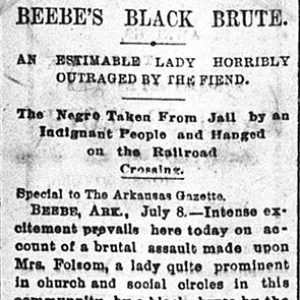calsfoundation@cals.org
James Bailey (Lynching of)
On July 9, 1891, James Bailey was hanged from a railroad crossing sign in Beebe (White County) for allegedly attacking a white woman.
There is very little information available on Bailey. The only African American named James Bailey in White County at the time of the 1880 census was five years old. He was living in West Point Township with his mother, Fannie, and five siblings. If this is the correct James Bailey, he would have been only sixteen years old at the time of the lynching.
The alleged victim was a Mrs. Folsom. There was still a Folsom family in Beebe at the time of the 1900 census. Henry Folsom, a forty-five-year-old day laborer, was living with his wife Maggie (age forty) and their five children (age four to fifteen). They had been in Arkansas since at least 1885, when their oldest child was born.
According to newspaper reports, on the evening of July 7, the women of the Methodist church were holding a festival near the church. Bailey, who was “looked upon as a town loafer,” was seen loitering nearby. When a storm hit at 9:30 p.m., Mrs. Folsom headed back home with the thirteen-year-old daughter of J. F. Bass. As they were rushing home in the dark, they collided with James Bailey. He allegedly grabbed the girl’s shoulder and accused her of trying to push him off the sidewalk. She escaped and ran to a neighbor’s house. Folsom also began to run, but Bailey caught her, knocked her down, and “brutally outraged her person.” She was able to recognize him because of the flashes of lightning in the storm. She reported the assault and also said that her purse had been stolen.
Bailey was arrested on the morning of July 8 and appeared before a justice of the peace. He denied assaulting Folsom, and as her purse had been found nearby, he was released. Later that morning, Folsom decided that she needed to see a doctor, whom she told about the assault. Word of these events soon spread around Beebe, and a large mounted posse set out to find Bailey, who had left town. The offer of a $125 reward attracted many others to join in the hunt, adding to the 500 members of the official posse. In fact, most of the men in Beebe were on the hunt, and many of the businesses were closed. According to the Arkansas Gazette, “The greatest indignation prevails, and if Bailey is caught up with it will only be a matter of a few seconds before the community will be fully avenged of the outrage.”
Around 3:00 p.m., Bailey was caught near Garner (White County). There exists a first-person account of his capture and lynching, written by Eugene Hardeman (E. H.) Abington, who detailed being a member of the posse that ran down Bailey; although he does not mention Bailey by name, the event fits his description. In the third chapter of Abington’s book, Back Roads and Bicarbonate, he mentions working at a sawmill located in the “lily-white territory” of the county and seeing one day a black man walk by. Thirty minutes later, Abington and his co-workers were informed that a black man had reportedly raped a white woman in Beebe. Abington subsequently aided in chasing down the man they had seen, joined by Earnest Jordan and Blacksmith Robinson, as well as an unnamed fourth man. The four men captured their quarry near the town of Garner, where they acquired rope to tie him up and telegraphed Beebe to spread the news. According to Abington, local African Americans “formed a mob of twenty-five or thirty” with plans to take Bailey from the posse. Told about this group by a local sheriff deputy, W. A. Powers, Abington and Jordan took Bailey to Beebe by means of a circuitous path through the woods and turned him over to the law there.
According to newspaper accounts, Bailey allegedly confessed and was jailed. A mob removed Bailey from the jail, and he was hanged from a railroad crossing sign at 12:30 a.m. on July 9. Abington describes the lynch mob thusly: “There were no women, no Negroes. There was no noise, no disorder. Only four or five men wore masks, just the ones who did the work.” According to the Gazette, he “seemed to care nothing for the awful crime he had committed….He met death with stoical indifference.” The coroner’s inquest, held on July 9, reached a verdict that Bailey had been hanged “at the hands of unknown parties.” Beebe, meanwhile, was “quiet and orderly, and public sentiment approves the deed.”
For additional information:
Abington, E. H. Backroads and Bicarbonate: The Autobiography of an Arkansas Country Doctor. New York: Vantage Press, 1955.
“Beebe’s Black Brute.” Arkansas Gazette, July 9, 1891, p. 1.
“The Correct Verdict.” Arkansas Gazette, July 10, 1891, p. 1.
Nancy Snell Griffith
Clinton, South Carolina
 Civil Rights and Social Change
Civil Rights and Social Change Post-Reconstruction through the Gilded Age, 1875 through 1900
Post-Reconstruction through the Gilded Age, 1875 through 1900 Bailey Lynching Article
Bailey Lynching Article  White County Lynching
White County Lynching 



Comments
No comments on this entry yet.